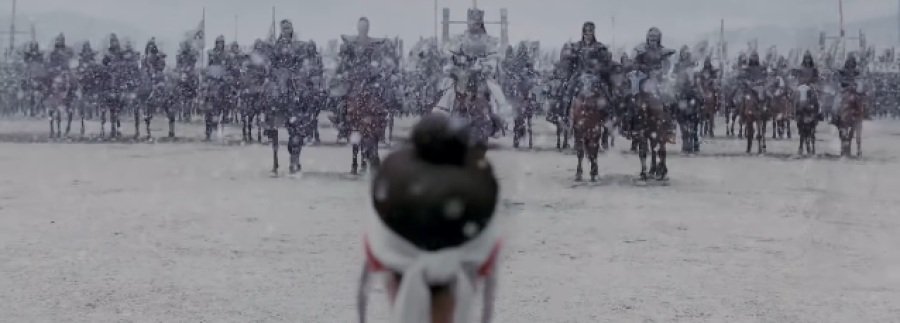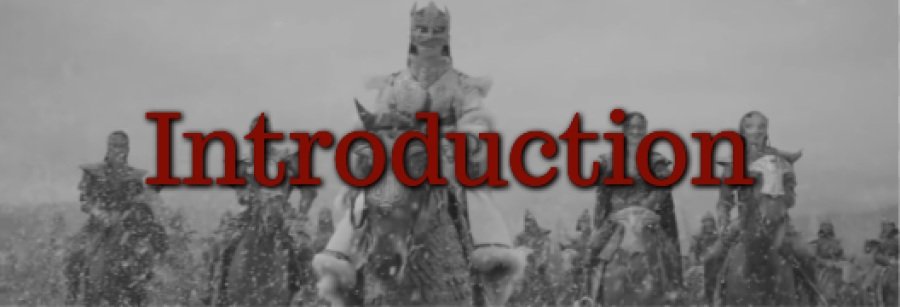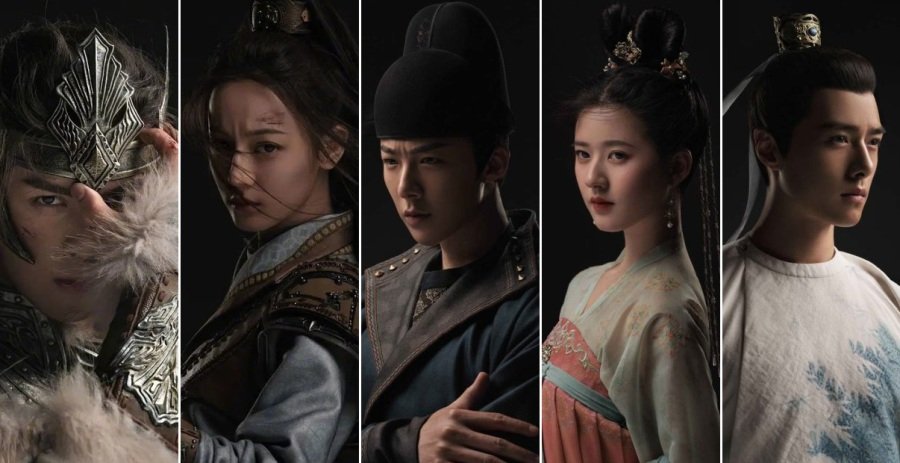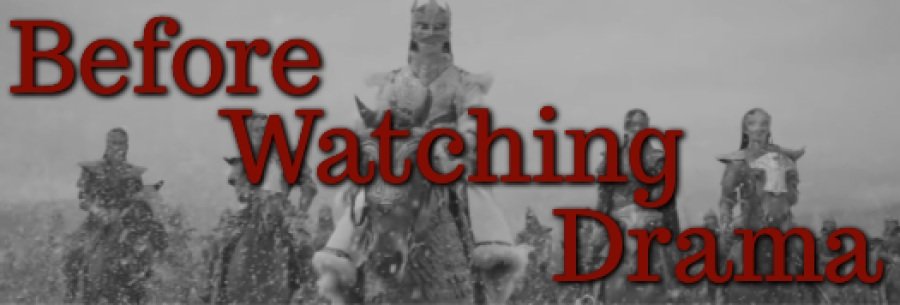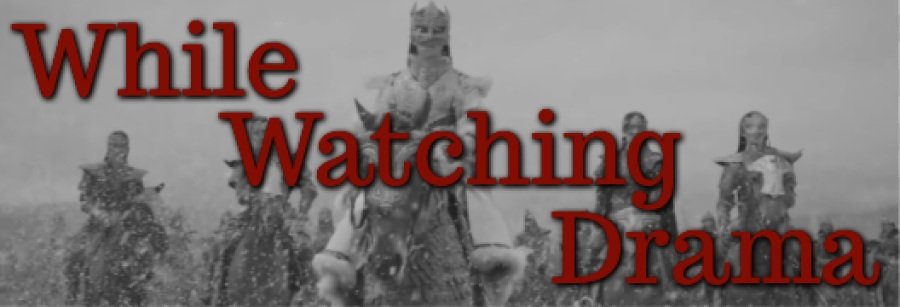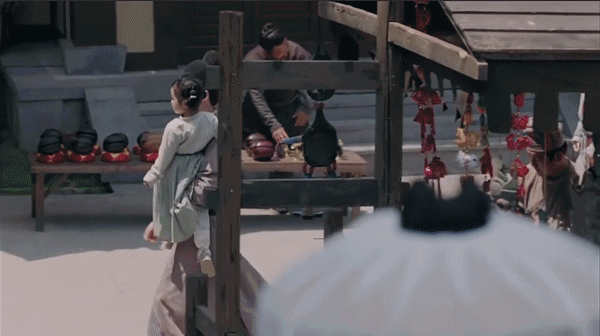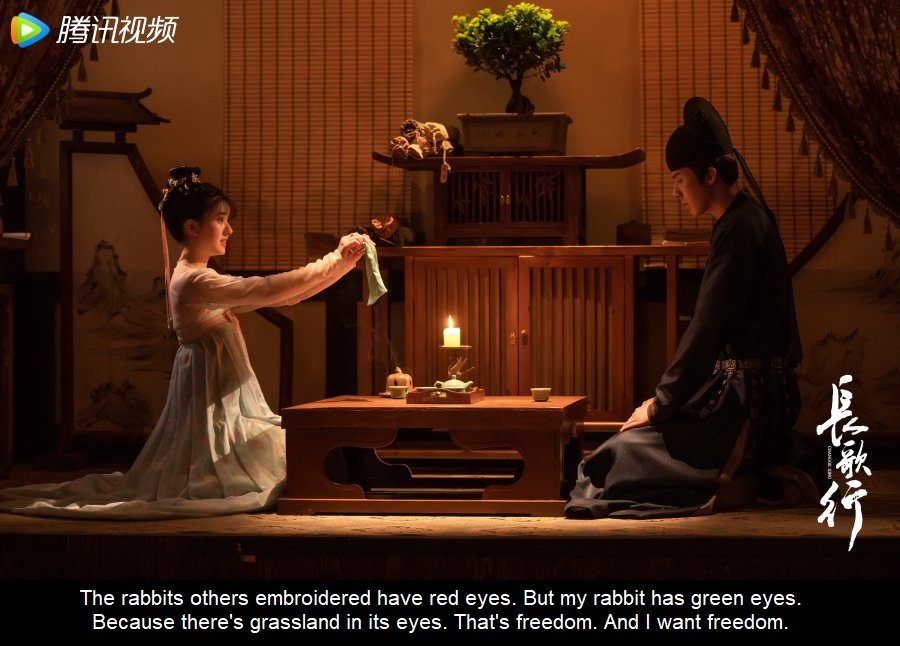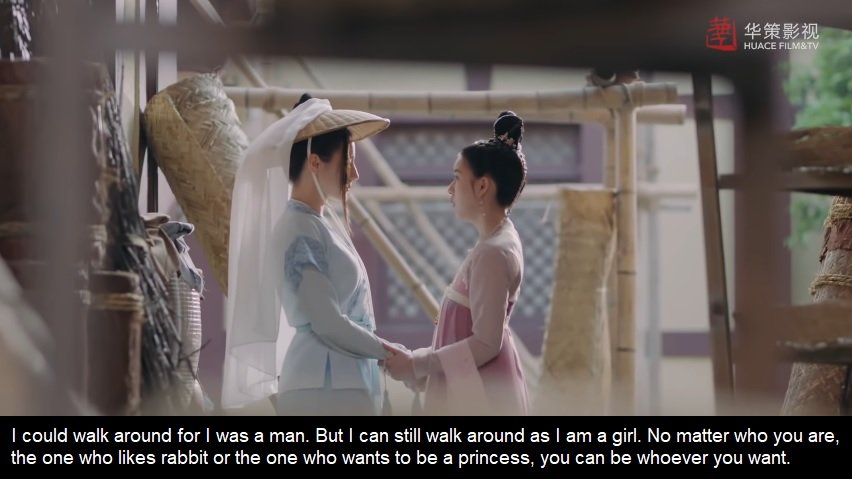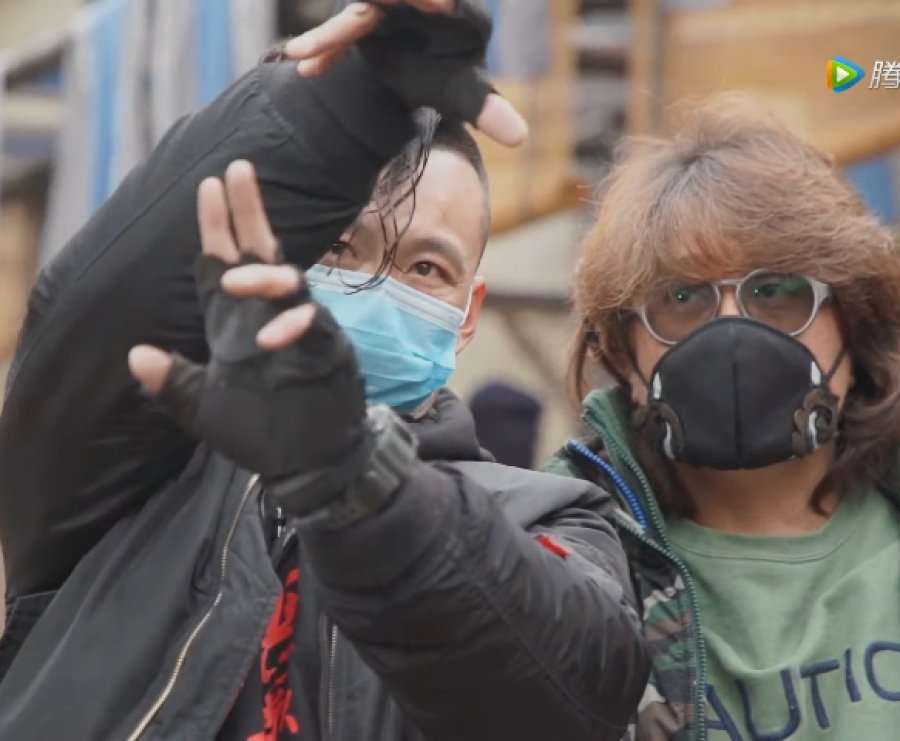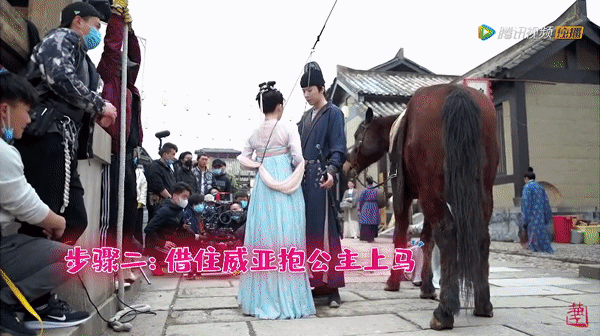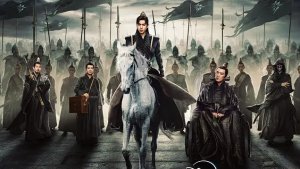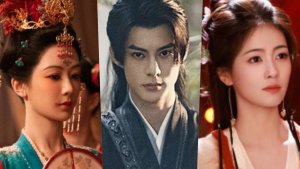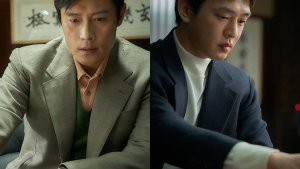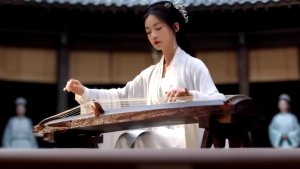 The Presence of Arts in The Double
The Presence of Arts in The Double
MILD SPOILERS on characters and scenes. It can be viewed in Dark/Light Mode. |
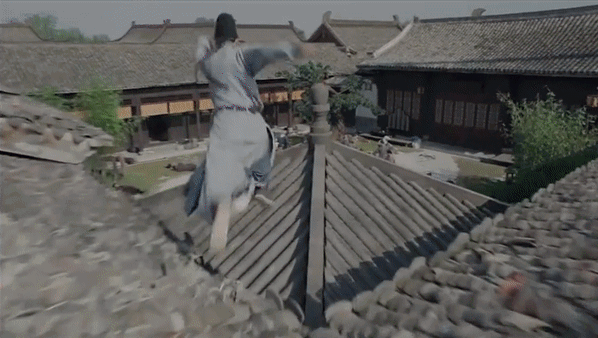
The Long Ballad tells the story of a princess who must seek revenge for her family, and in doing so, her fate intertwines with a handsome tribal prince. The drama is an adaptation from the 2011 manhua Chang Ge Xing (长歌行) by Xia Da (夏达). She is a renowned and prolific cartoonist who has a wide repertoire of award-winning works including Zi Bu Yu (子不语) and Bu Tian Ge (步天歌). | ||
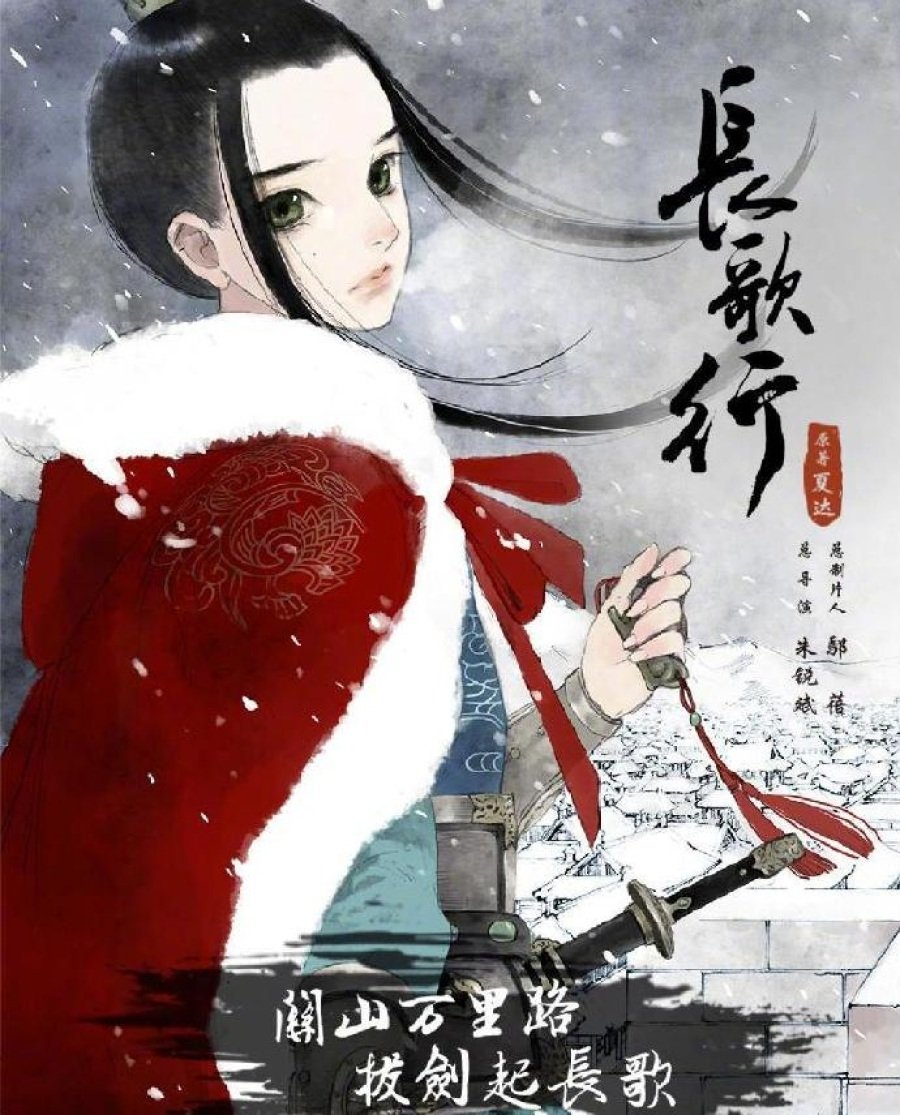 Chang Ge Xing Chang Ge Xing | Genres: Action, Historical, Romance, War Episodes: 49Duration: 45 minutes Aired: Mar 31, 2021 - May 3, 2021 MDL Rating: 8.5 Where to watch (Eng sub):Trailer: Viki Global TV | 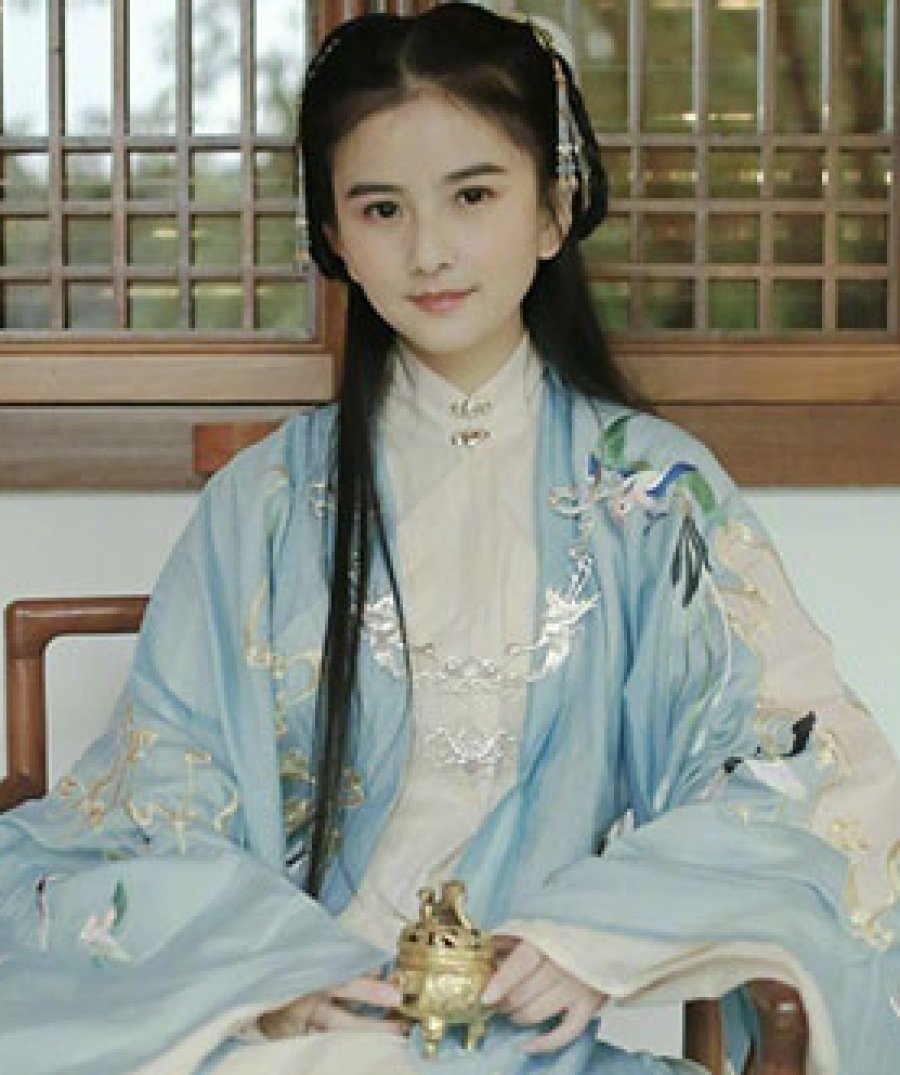 Xia Da Xia Da |
Tags (no spoilers): Strong Female Lead, Strong Male Lead, Smart Female Lead, Smart Male Lead, Political, Betrayal, Death of Family, Revenge, Tragic Past, Hidden Identity, Cross Dressing, Power Struggle, Rebellion, Murder, Adventure, Sword Fight, Martial Arts, Character Development, Enemies to Friends, Slow Burn Romance, Friends to Lovers. | ||
WHY WE WROTE THIS ARTICLE
We simply love watching great dramas, and there's no better way to express our appreciation for them than by talking about them. Writing articles here on MDL is one of the best ways we're able to spread our love and to create awareness for wonderful productions that are worth sharing, like The Long Ballad.
At the same time, we do realize that there are, in fact, many MDLers out there who may not have experienced or fully embraced the allure of historical productions for various reasons. It might not be your cup of tea, which is completely fair enough. Maybe you find this genre intimidating, having heard a lot about it, or perhaps have yet to try it out simply because you do not know where to start.
This is precisely why we are exploring this drama as a case study. Through this light-hearted and fun yet in-depth analysis, we sincerely hope to provide some useful pointers as well as to clear any doubt that you may have regarding this fascinating genre - the Chinese historical dramas.
WHO WE ARE
I'm W  andereR. A down-to-earth guy from the tropical island of Borneo. I watch all kinds of genres, as long as they're done well. I literally grew up with Asian dramas and have continued to enjoy them for many years until today. I mostly watch Chinese, South Korean, Japanese and HK productions. I'm a binger of both airing and completed dramas. andereR. A down-to-earth guy from the tropical island of Borneo. I watch all kinds of genres, as long as they're done well. I literally grew up with Asian dramas and have continued to enjoy them for many years until today. I mostly watch Chinese, South Korean, Japanese and HK productions. I'm a binger of both airing and completed dramas. | 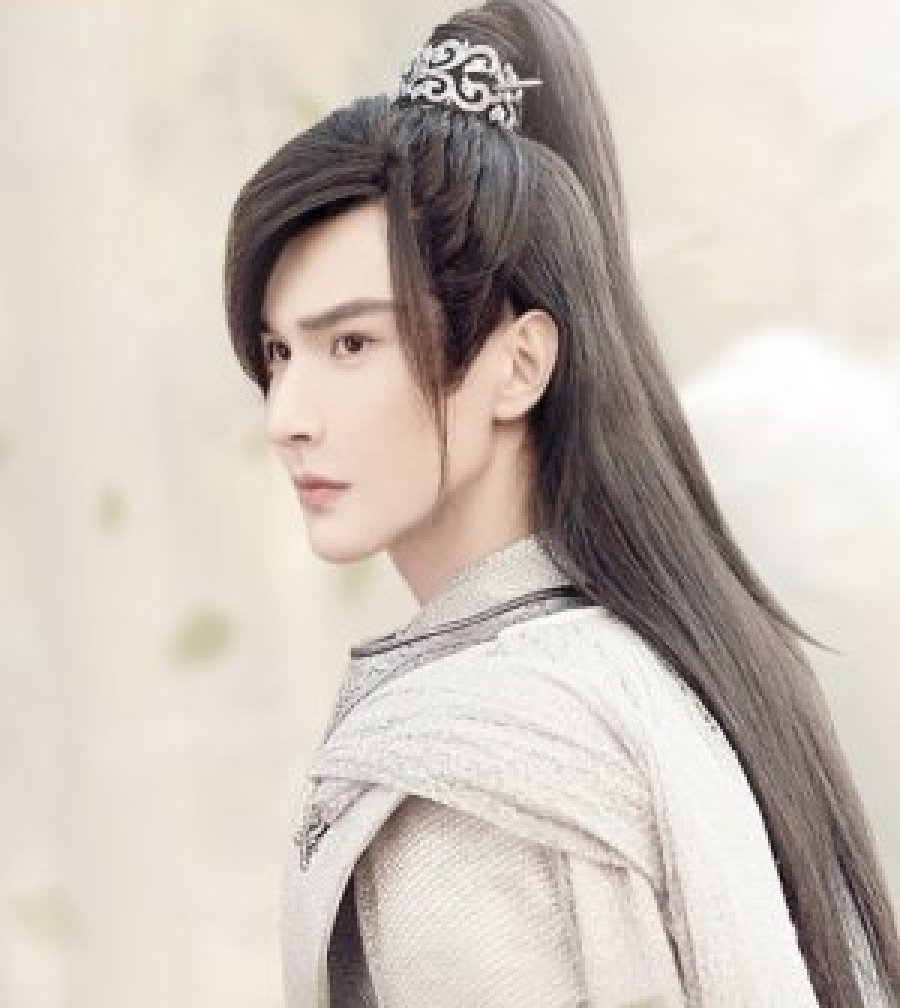 I'm Cho Na, a female from the U.S. Favorite genres: romance, comedy, and action. I started watching Asian dramas less than 2 years ago. I watch from 6 countries, Chinese dramas are the most-watched (40%), and 45% of them are historicals (mostly costume romcoms). I'm a binge-watcher who watches completely subbed dramas, one at a time. I'm Cho Na, a female from the U.S. Favorite genres: romance, comedy, and action. I started watching Asian dramas less than 2 years ago. I watch from 6 countries, Chinese dramas are the most-watched (40%), and 45% of them are historicals (mostly costume romcoms). I'm a binge-watcher who watches completely subbed dramas, one at a time. |
WHY WE WATCHED THE LONG BALLAD
Ashile Sun | Li Chang Ge | Hao Du | Li Le Yan | Shu Yu |
Cho Na: I like all the main actors and their acting, having watched their previous works as main characters of their dramas. Wu Lei in CrossFire and movie Adoring; Dilraba in Love Designer and Eternal Love; Liu Yu Ning in Ultimate Note; Alen Fang in The Love by Hypnotic. As for Zhao Lu Si, she is one of my favorite actresses. I have watched 5 of her dramas! |
WandereR: I'm a huge fan of historicals, and as far as C-historicals are concerned, Tang Dynasty is my favourite era, which The Long Ballad is set in. I find the premise of the story intriguing, while I'm absolutely captivated by the cast as well as the production crew. Ever since the trailer was released in 2020, I've been waiting patiently for this drama to be aired. |
Another compelling reason to watch the drama? For users participating in the ongoing 2021 MDL Watch Challenge, you'd be pleased to know that The Long Ballad fulfills the criteria of no less than 17 blocks out of the 40 available blocks. But don't forget, it can only be used once in the challenge.
MDL's 2021 Watch Challenge Matched Criteria
|
|
TOO SCARED TO START
As Lao Tzu once said, "A journey of a thousand miles begins with a single step". The best way to overcome your fears is to face them head-on, and here's how we'll do it - by getting to the root cause of your potential fears.
Not sure where and how to start?
You've come to the right place. This article will help you get started on your way to enjoying this epic drama. Hopefully, you'll find all the answers you need from this write-up as well as from us should you have further questions.
Everything from where to watch it, what to expect and to prepare for, the notable cast involved, and special features as well as themes to check out.
The length of this drama sounds scary?
Don't worry; we've seen a lot worse! There are C-historicals that are up 100 episodes and even beyond! Some Japanese historicals (or taiga drama) and Korean historicals (or sageuk) can be up to 60 episodes as well, with each episode lasting for nearly an hour or more. There are, of course, shorter ones as well, but generally, most epic historicals go the distance as part of the long-haul experience.
The Long Ballad comprises 49 episodes, where the length of each episode is approximately 45 minutes. If you minus off the lengthy intro and outro sequences, the actual running time per episode is only 42 minutes, which is slightly over half an hour. It doesn't sound too intimidating, does it? That's about the perfect timing for washroom breaks and to top-up your snacks in between or during your binge.
As this drama has completed its airing schedule, all fully-subbed episodes are available for immediate enjoyment at multiple platforms, including free-of-charge ones! You don't have to worry about the excruciating waiting time for episodes and subs, and in the process, forgetting what you've actually watched.
More importantly, you won't have to deal with cliffhanger endings at the end of every episode!
Need technical and emotional support?
Again you as the potential viewer are very well served not only through this article but also just by being here on this wonderful platform where fellow MDLers are ever ready to lend a helping hand. You will find extensive discussion topics, group support, and source of information at the drama page's comments board, discussion forum, and also the site's Public Feeds.
All these nifty features are made easily accessible at the tip of your fingertips, and as long as the useful "spoiler option" is clicked, you won't have to worry about being spoiled (unless you want to!).
For this drama specifically and the historical genre, in particular, you would be pleased to know that additional support can be found at the Historical Dramas Club. The first of its kind in MDL, this club was recently set up on 1 March 2021, where its activities, discussion topics, and source of information are available for all MDL users. You're welcome to check it out or even join as an official member to talk about any historical drama produced by each of the 7 countries showcased in MDL.
DO AS LE YAN DID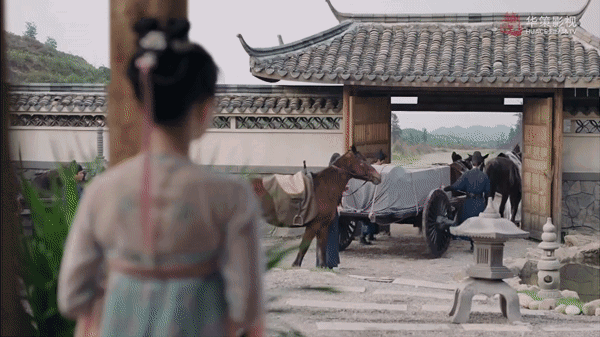 Le Yan was a timid and obedient princess. But one crucial time, she braced herself and made a decision on her own. Sneaking into a departing cart, she embarked on an amazing journey that changed her life! Le Yan was a timid and obedient princess. But one crucial time, she braced herself and made a decision on her own. Sneaking into a departing cart, she embarked on an amazing journey that changed her life! |
PREPARATION:
DO YOU NEED TO READ THE MANHUA, HISTORICAL FACTS,
REVIEWS AND/OR COMMENTS?
Depending on individual viewing styles, some viewers may prefer to fully understand what they're getting themselves into and to better anticipate the entire story, while others might want to "go in blind" by just being entertained and are happy to encounter surprises along the way. Whichever option works, as long as you feel comfortable.
The Manhua
As far as The Long Ballad is concerned, the manhua (Chinese comics) source material is widely available for your reading pleasure. But fair warning: to date, it is incomplete, thus leaving a substantial portion of the drama's plot to be reimagined by the screenwriter.
The History
Although the story is fictional, certain events depicted are based on actual historical records. For instance, the Xuanwu gate incident, the war with the Eastern Turkic Khaganate, and certain historical figures portrayed therein, notably Emperor Tai Zong and his team of advisors. If these historical events and people do pique your interest, you may decide to check out the actual backstories either before, during, or even after watching the drama. Nonetheless, we attest that The Long Ballad can be fully savoured without the need for extensive prior knowledge of or research into all the historical facts.
Opinions and More Opinions
Comments and reviews are useful sources of information, much like this article are as well. Being based on the diverse opinions of the drama watchers, they are indeed subjective and non-exhaustive. There's absolutely no harm in checking out the thoughts shared from various viewpoints, but it's important to rely on your own judgment at the end of the day and to at least give the drama some benefit of the doubt by watching the first couple of episodes to gauge your interest levels of the production and the direction of the plot.
Resources
Here are some links to get you started, should you choose to do some brief research into this production:
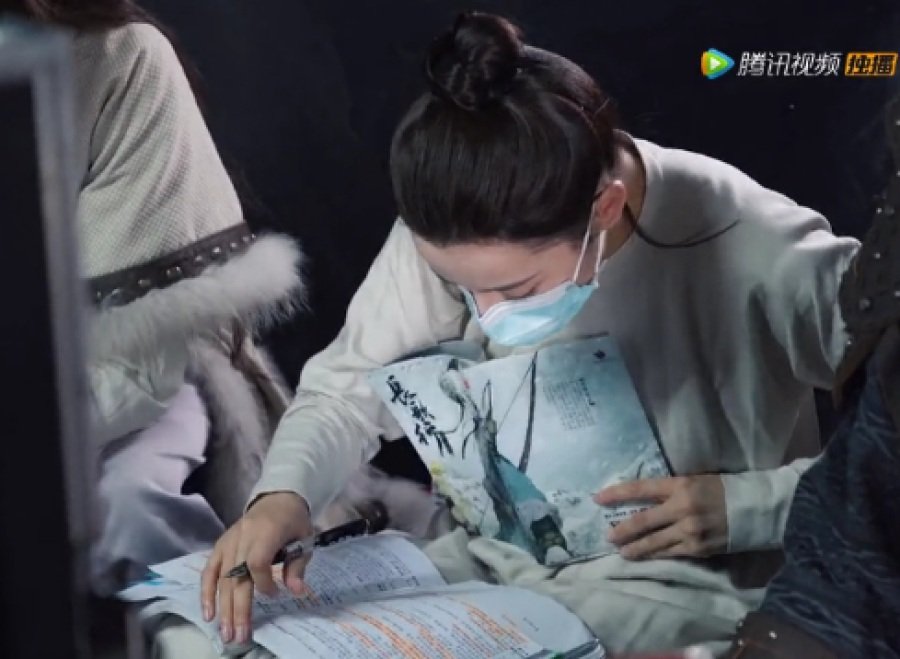 Besides studying the script, Dilraba also read the manhua to get an in-depth understanding of the character Chang Ge. Besides studying the script, Dilraba also read the manhua to get an in-depth understanding of the character Chang Ge. |
WE WILL TAKE YOU THROUGH THE THRILL!!!
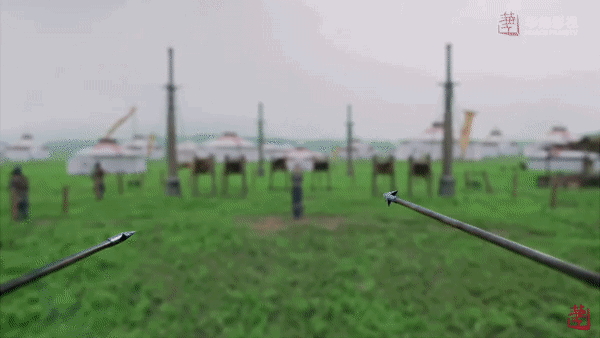
PACING: SLOW START AND DRAGGY IN THE MIDDLE
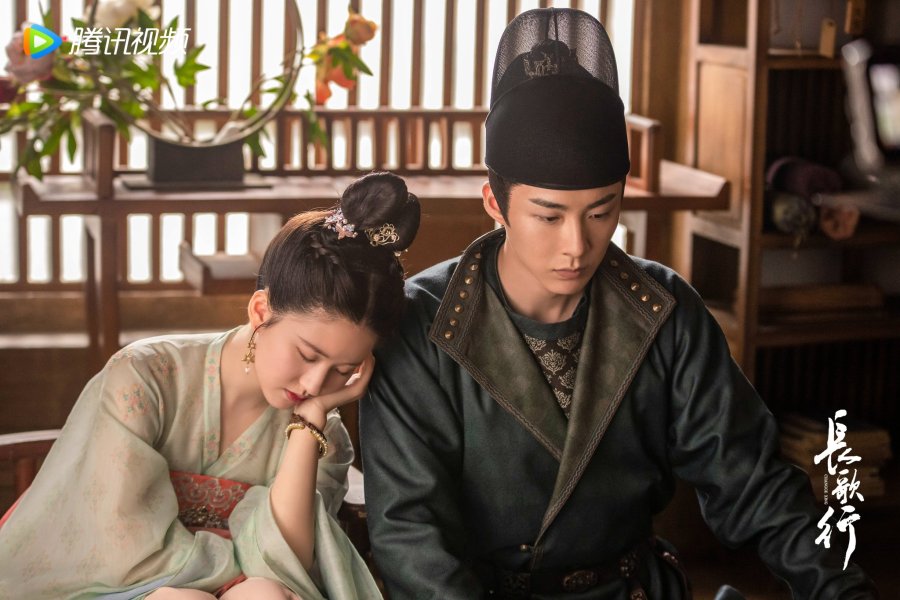
Slow Start: Historical Drama Conventions vs The Long Ballad
The first thing that comes to mind when talking about any historical drama - the infamous slow start that puts you to sleep! The first few episodes usually establish the groundwork of the plot in preparation for what is to come. This means introductions to numerous characters and their respective backstories, how they are related to each other and what motivates them. This usually involves a lot of dialogues, flashbacks, and narration. All these elements are then intricately interwoven to form the basis of the main overarching story (and possibly side stories too).
In the case of The Long Ballad, however, we have promising news! The first few episodes start off like a house on fire. The story picks up rather quickly with an infusion of many actions, minimal fillers, and only a handful of key characters being introduced. The pacing is engaging and brisk, which won't leave you bored or snoozing. Viewers are not bombarded with characters after characters and long conversations between them. Instead, the proceedings kick-start with a breathlessly exciting ancient ball game of cuju!
Draggy in the Middle: Much Ado About Nothing
Certain C-historicals have this tendency of dramatically slowing down the pace of the storytelling at the midway point. This is typically seen in long-drawn-out dramas with 40 episodes or more, where fillers or non-essential plotlines get added in and drag on for the following 8 or so episodes. These scenes usually comprise brief misunderstandings, separations, and/ or mini-story arcs involving one or more characters. Some incorporate slice-of-life events and character growth, while others may inject some form of humour or even parody. Either way, this phenomenon is very real, and some folks may find it insufferably tedious and draggy.
The Dark Arts
For the uninitiated, here's what most seasoned viewers do. We either speed watch or fast forward.
- Speed watch - depending on which streaming platform or media player that you're using, playback speeds are usually available as an option. Most max out at 2.0x, but higher speeds have been known to be utilized. Some viewers swear by watching all dramas faster than the normal speed either to save time or for the comedic effects.
- Fast-forwarding - Also known as time skips, you have the option of clicking the FF 10 seconds feature or simply scrolling forward (horizontal scrolling) until the desired scene is reached.
The Long Ballad: A Rollercoaster Ride
The Long Ballad is one drama where so far, we haven't found the need to employ the dark arts. The momentum of the story progression is evenly sustained throughout the entire 49 episodes, where all the major characters' utterly engrossing story arcs are satisfyingly fleshed out. This drama will literally take you on a wild rollercoaster of emotions, so much so that instead of fast-forwarding scenes, you'll find yourself rewinding them to relive those poignant moments!
You know a drama becomes draggy when... |
SO MANY NAMES AND LOOK-ALIKES
So Many Names: Historical Norms
Most historicals, if not all, are similar in this aspect. Everyone has multiple names, except perhaps the "mysterious men in the mask" hidden identity trope (which usually makes an appearance every now and then, like how the white truck of doom does too in K-dramas). For those characters who wear no mask, they're either royalty (which means titles upon titles and formal salutations), noble class (official designations, formal and courtesy names), or military (usually a general). Sometimes, when different cultures are involved, exotic names are introduced.
The Long Ballad: Exotic Names
For this drama, the Ashile Clan is heavily involved in the story, which means a variety of colourful exotic names being featured. Furthermore, the Female Lead and Second Female Lead are either addressed by titles or names because they're both members of the royal family. The Male Lead and Female Lead each has an additional alias when they disguise themselves, which happens quite often.
Our tip? There are 2 ways to help with the names:
1. Use a character chart. There's plenty being shared on the drama page's photo section, although it's not a translated version meaning you may have to add in brief notations. For this drama, a really simple chart will do the trick without the need for multiple arrows and lines, like this one right here.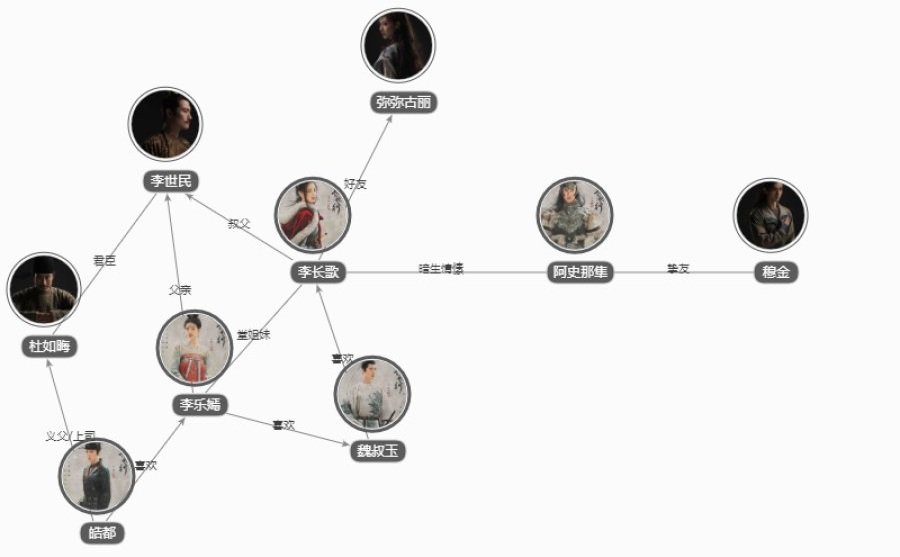
A complete character list is here, along with the actors, voice actors, and the relationships. Beware: though extremely helpful, it's a major spoiler. Use only when you are completely lost!
2. Or, don't worry so much about what they're called and just go with how they look. The story revolves mainly around 5 major characters: Chang Ge, Ashile Sun, Le Yan, Hao Du, and Shu Yu. The good thing about this show is that it's not overly complicated, convoluted, or inundated with countless characters.
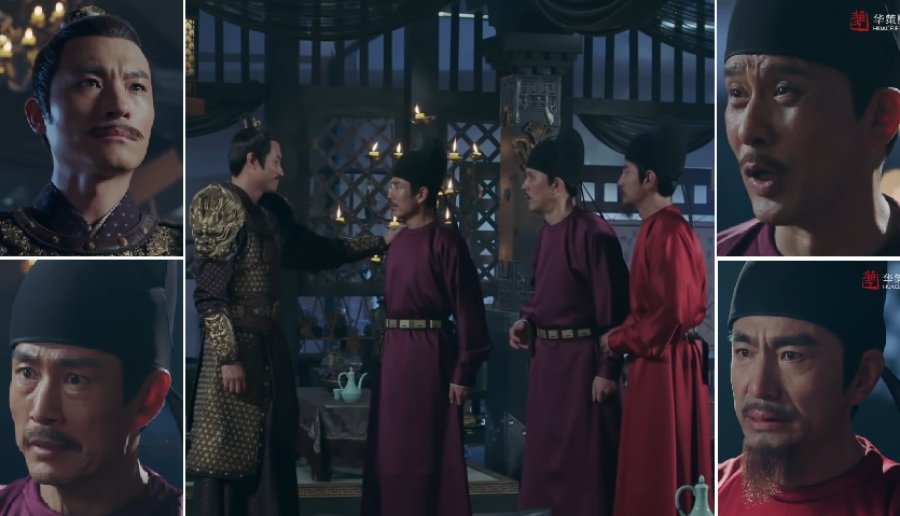 Emperor Taizong of Tang (Geng Le), Chancellor Du Ru Hui (Cheng Tai Shen), Chancellor Fang Xuan Ling (Yang Zi Hua), and Chancellor Wei Zheng(Tan Jian Chang). These four characters are China historical figures (source: Wikipedia). They do look alike, but distinguishing them can be easy when they're in the same room. Emperor Taizong of Tang (Geng Le), Chancellor Du Ru Hui (Cheng Tai Shen), Chancellor Fang Xuan Ling (Yang Zi Hua), and Chancellor Wei Zheng(Tan Jian Chang). These four characters are China historical figures (source: Wikipedia). They do look alike, but distinguishing them can be easy when they're in the same room. |
Look-Alikes: Long Lost Twins or Relations?
Speaking of faces, there are times when certain characters share very similar looks indeed. This happens a lot in any historical, especially with the older male characters. For instance, the ministers, advisors, and the noblemen all wear similar outfits and hats, style their hair the same way, and sometimes even sound almost the same!
In this drama, we have a grand total of 4 characters who somehow look like they could be related! And they almost always appear on screen together, so you'll find yourself wondering which one is which.
Identifying Quirks
If you have a fantastic memory and are good with faces, this shouldn't be a problem. If not, don't worry. Usually, what we do is identify the unique features these characters individually possess. Fortunately, these 4 gents happen to have their very own identifiable physical traits:
1. Looks utterly mischievous and cheeky who can't seem to stop smiling, like your favourite kindly old uncle.
2. Appears stone-faced most of the time while engaging in endless scheming and plotting. And he coughs quite a fair bit as well, towards the latter stages.
3. Doesn't have a mustache until he grows one much later, who happens to be the Emperor (so this one's pretty distinguishable).
4. Continuously worried and on the verge of collapsing, like he carries the weight of the world on his shoulders and the only one with a pretty long goatee. Oh, and his officer's uniform is a brighter shade of red.
There are a couple of other older male characters, but they appear later in the show and in totally different locations. One of them wears an eye patch, while the other has a lighter shade of gray in his hair than the rest. See, that wasn't too difficult once you're aware of their individual quirks.
SO MANY PLACES
COVID DANCE
One of the many places in The Long Ballad is the land of Mobei. Watch the entertaining folk dance that was choreographed using movements that symbolize prevention measures for COVID-19: washing hands, wearing a mask, social distancing, etc. The dance was led by none other than the King of Mobei himself, starred by the exquisite Richards Wang. |
Royalty and the Palace
Some historicals are focused primarily on a single location, usually at the palace right in the heart of the capital city, especially when royalty is involved. These privileged folks don't go out much, and the Empresses, Consorts, and Princesses tend to prefer scheming in their harems over freshly brewed tea and osmanthus cakes. Other dramas, however, are set in multiple locations, where the action is evenly spread out, and viewers get to explore a lot more variety of the environment and scenery. Fun fact: the historical genre tend to feature some of the most spectacular and awe-inspiring landscape and cityscape visuals in dramaland!
Ancient Travelogue
You will notice that the Princesses featured in The Long Ballad are not your average palace-bound types. These ladies love traveling! Because of this, several places of note are featured so you won't ever get bored being stuck at just one venue. The story starts at the famous Imperial capital of the Great Tang, Chang'an. After that, the action picks up at the frontier city of Shouzhou, which borders Mongolia. Of course, since the Ashile Clan is featured, we'll be taken on a short ride to the beautiful grasslands of the Mongols. The ancient city of Luoyang will be the scene of a number of dramatic story arcs before we arrive at the frontiers of Mobei (Northern Desert).
Each of these unique exotic locales showcases more than just rustic charms and gorgeous scenic views. Viewers will get to experience the culture and way of life, especially those of the Ashina and Mobei tribes, which are distinct from the Han culture of the Central Plains.
Experience the journey and embrace new discoveries through the main characters' travels across Northern China!
TOO MUCH BLOOD, TOO MANY DEATHS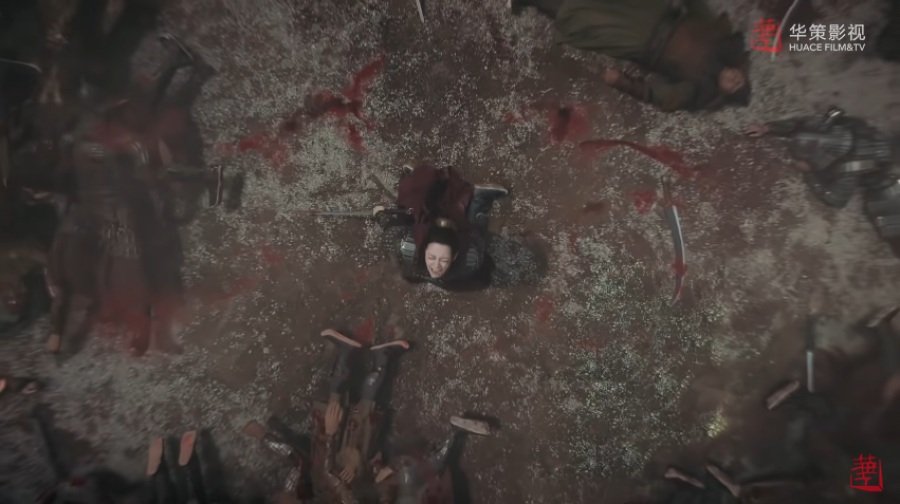
Ticking Off the Checklist
Every serious historical drama will almost certainly contain a standard set of tropes, clichés, and plot devices. More often than not, they revolve around deaths and, of course, blood. Most of the time, though, the deaths are not caused by blood loss, but it still gets featured a lot because blood-spitting/ vomit really is a thing for this genre!
Fans of this aspect actually do exist because, for them, certain portrayals are simply aesthetic - some characters excel in spitting blood ever so elegantly and artistically (we have recommendations for this but probably in future articles as a separate topic).
Then, of course, some historical dramas are set during times of war, where the majority of the action takes place on the battlefields depicting massive bloodbaths and deaths.
How Much is Too Much?
As a bona fide historical and one set during an era of constant strife and conflict between warring nations, The Long Ballad is no exception and features much death in all its glorious forms!
Not everyone loves the macabre, so it's perfectly understandable to skip or fast forward such scenes. Fear not, for we have very assuring news for you - this drama is generally quite sanitized for viewers. Most of the battle scenes in this drama transition to a combination of manhua and donghua instead of being presented as live-action. Visually innovative and very child-friendly too.
As for the amount of blood loss depicted, back in the live-action format, it really is quite minimal. In fact, compared to the many historicals that we've seen, the volume doesn't even amount up to half a pint (which is much less than the minimum of a single donation at the blood bank).
Dealing with Deaths of Characters
Especially the loss of well-loved characters. Without spoiling anything or sugar-coating such tragic circumstances, here's our pro tip - be fully prepared! Depending on your personality, state of mind, and tolerance levels, we recommend our much-trusted "drama tragedy survival kit" containing the following:
- A box of 3-ply ultra-soft tissues. They're absorbent and gentle for all skin types. It's not just useful for happy occasions since you'll be needing it to wipe tears of joy or laughter and for cleaning up after bingeing on snacks.
- Speaking of snacks, you need to sustain not only your energy but also boost your endorphins as well as your serotonin and dopamine levels for that dose of (emotional) pain reliever and to cope with the stress. Proven research has shown that the best foods to help your brain release endorphins and the body to produce more serotonin and dopamine are chocolates (especially dark chocolates), bananas, sunflower seeds, and walnuts are among those that are convenient to snack on. Even spicy food is a great way to stimulate your body to produce happy chemicals, so feel free to grab that instant cup of hot ramyun!
- Probably the most important of all - log in to MDL. Talk to someone, rant, share your experience, basically get access to virtual group hugs and emotional support. But don't forget to mark your posts or comments as a spoiler!
POETIC LANGUAGE AND METAPHORS
Of Metaphors, Similes, Idioms, and Poetry
One of the unique features of any historical drama is the beautiful use of classical languages in both the written and spoken form to convey the meaningful proverbs and philosophical messages behind those words. This drama is no different, and although the metaphors and idioms written in the script may not be as extensive as certain other productions, we are still given a number of scenes that showcase this aspect. References are made to Sun Tzu's Art of War in devising battle stratagems, the concept of calmness, mindfulness, and "inaction" from Taoist principles, the subtle meanings induced by a game of Go, and certain poetic articulations by various characters throughout the drama.
The key to comprehending and appreciating such metaphorical expressions, particularly if you're not a native speaker of Mandarin, is to rely on good quality subs. Subbers who appreciate the nuances of the language will take greater care in transcending mere literal translations in order to relay the true figurative meanings as they were intended from the dialogue. The quality of the subs delivered across the available international streaming platforms is generally quite acceptable, and the meaning of the script is thankfully not lost in translation.
POLITICS/POWER STRUGGLE
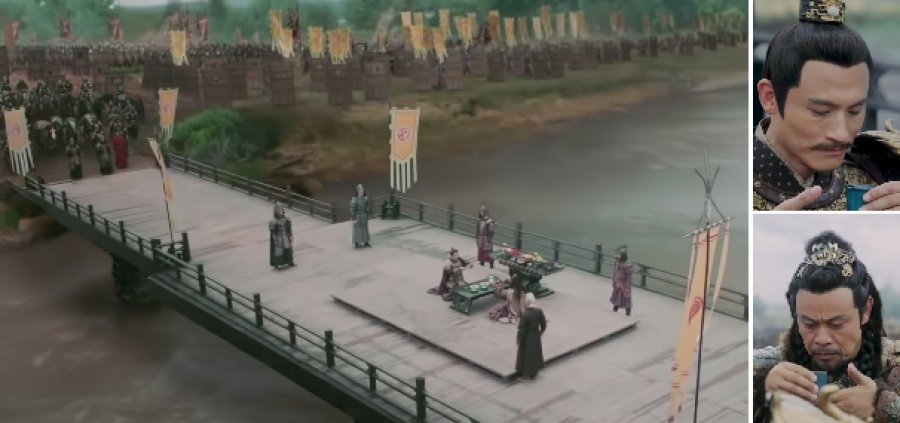 In historical dramas, we have palace politics with too many talks (same with modern politics) and drinking tea. In historical dramas, we have palace politics with too many talks (same with modern politics) and drinking tea. |
The End Justifies the Means
Politics, power struggles, and survival of the fittest are themes common in historicals, much like romance and comedy in rom-com. Some politics are heavy and complicated because it involves many factions, while others are pretty straightforward and revolves around the same group of characters. Regardless of the seriousness and complexity of the story, your enjoyment of this aspect is completely dependent on how you feel about ancient politics. The themes typically depicted can be summarized as the following:
- Fight for the throne (including the right to be the Crown Prince or the outright ruler as the Emperor or Empress)
- Fight for the Emperor's affections (also known as harem politics)
- Fight for the country (either to defend from invasions or to invade others)
- Fight for justice (usually involves a revenge plot and destruction of everything in its path)
- Fight for all of the above (this happens rather often too!)
Relish the Powerplay
Power struggles, especially when it's well written and depicted, can be most satisfying. Of course, if this isn't right up your alley, then it would be a real struggle to get into it. The politics is actually quite simplistic and minimalist in its execution through this drama and predominantly involves the fight for the throne, the country, and justice. That said, don't expect countless motions or debates by ministers in the throne room or harem fights in this show. In addition to moments of clever scheming and nefarious machinations, The Long Ballad is generally much more action-oriented, where characters let their swords do the talking most of the time. You won't need to kill many brain cells in unraveling court intrigue for this one, so sit back, relax and enjoy the ride!
 But in The Long Ballad, we also have this! But in The Long Ballad, we also have this! |
DEPICTION OF WOMEN IN CHINESE HISTORICALS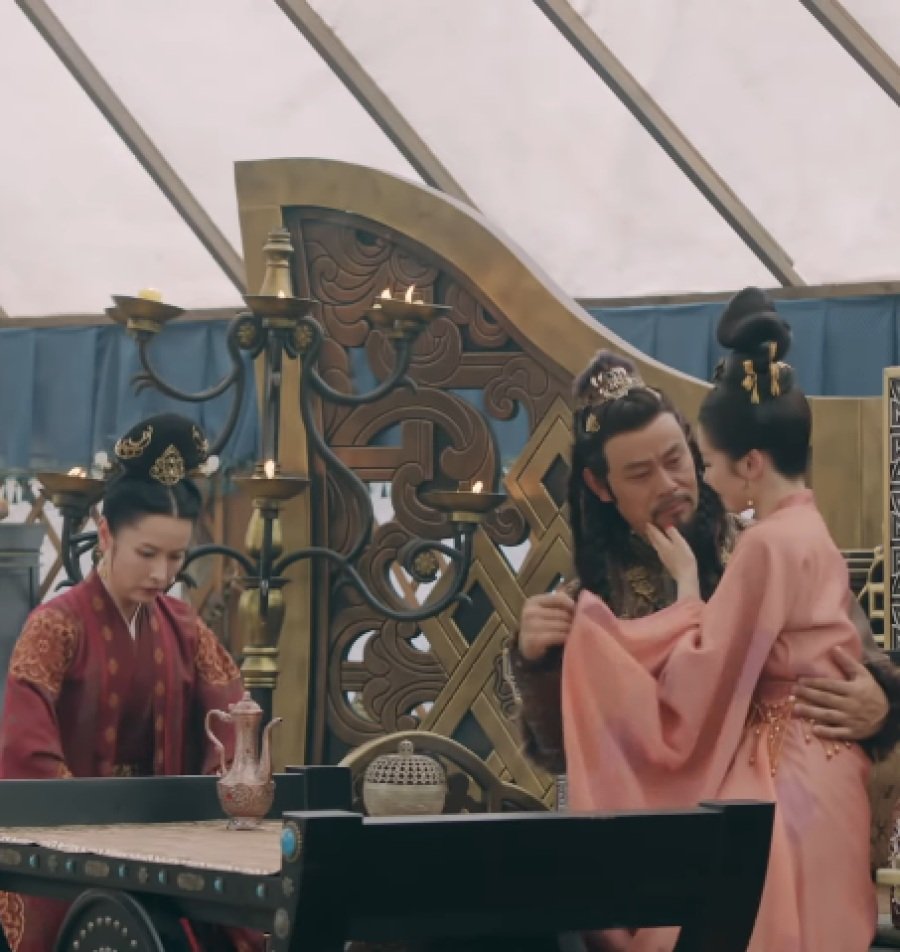
Inspirational with a Dose of Realism
Many historical dramas, whether they be Chinese, Korean, or Japanese, depict tales of strong women. In ancient history, such powerful characters really did exist. To have their biopics depicted in today's world is both a source of inspiration and also admiration of how these amazing women not only survived but flourished in the world of men.
That said, the prevailing societal norms and conventions of the era still existed, resulting in conditions where women were generally discriminated against and possessed very limited rights and prospects. For members of the nobility, most of the time, they are utilized as pawns in politics, while for those captured as prizes of war, a much worse fate awaits them. This aspect is usually written in the script to reflect the harsh realities in ancient China in those days, based on the following grounds:
- The code of conduct and etiquettes were heavily influenced by Confucianism and strongly enforced as a way of life.
- Being a hugely patriarchal society where the men are favoured to hold power and authority
- The cultural beliefs that greatly emphasizes preservation of the family name and lineage, which is linked to the practice of polygamy (and the rise of harems which existed not only in palaces but also in affluent households)
Women in The Long Ballad
In this drama, we get both the depiction of two strong female lead characters and the unfortunate circumstances faced by the supporting female characters. Chang Ge is strong in every sense of the word - in terms of physical attributes and abilities, mental fortitude and conviction, and transcending moments of anguish and torment to become even more formidable, like a phoenix rising from the ashes. She's definitely not your typical damsel-in-distress type of Princess. The same goes for Le Yan but through a slightly different trajectory. This character, who starts off being extremely repressed and naïve, with a yearning for courage and freedom, eventually undergoes a tremendous growth in experiencing the harsh realities of life and war, to evolve into a personality worthy of being hailed as a great heroine of the people.
On the other hand, a heads up though on the other less fortunate characters. Viewers will need to be prepared and understand the realism being depicted in this drama. The 7th century certainly wasn't as enlightened as the 21st century, so don't get mad or frustrated, just take it all in to process as a reminder that history isn't always sunshine and rainbows. There's a harem setting, portrayals of slavery and servitude, and some references to violence. Basically, there will be certain scenes of women being poorly treated. Interestingly a number of those depictions occur in the Ashile Clan. The Mongol culture tends to revere women much more than the practices of the Central Plains, which is evidenced by Mongol women being more liberated than their Han counterparts. Sadly, these special rights are not accorded to slaves. Nonetheless, as mentioned earlier, this drama is generally quite sanitized, and such uncomfortable viewing is rather short-lived. We promise.
In the past, although she was a princess, Chang Ge had to disguise herself as a man to sneak outside the palace. Le Yan also desired freedom but not as brave as her cousin and could only express her yearning through her green-eyed rabbit embroidery. Now Chang Ge realizes she doesn't have to be a man to be free, and she encouraged Le Yan to become whom she wants to be: the real princess of Tang people. |
SLOW BURN ROMANCE
Love Conquers All
Some like it fast while others like it slow. Personally, we don't mind as long as it's epic! Romance in historicals is usually well-paced over the entire duration of the series, leaving enough room for the relationship between the OTP to develop and grow. Some dramas incorporate angst and uncertainty as a subplot, while for others, certain plot devices involving tragic circumstances along the way. All of these approaches contribute to bringing the couple together and strengthening their bond in the process.
The Long Ballad has plenty of romance in its assorted manifestations, and they're mostly slow burn with impressively scorching on-screen chemistry. The interactions between the multiple characters keep the romance simmering and eventful throughout. Observe the organic development of mutual affections being gradually cultivated and nurtured as they eventually blossom into something magical and wondrous called love.
The dynamics are multifaceted, with layers upon layers of emotions and bonds intertwined with fate and destiny, culminating in an irresistible allure. So get ready to experience the love story because where we're headed, there's something there for everyone: enemy-to-lovers, friends-to-lovers, first love, love at first sight, love triangle, sismance, and bromance.
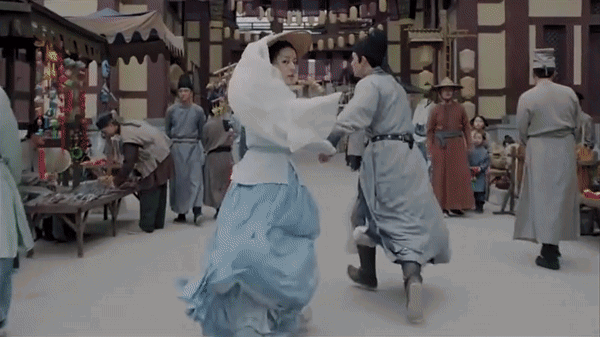
WHAT IS THE ENDING?
Expectations on the Closure
We all have different preferences on what constitutes an acceptable closure. C-historicals are like a box of chocolates because you never know what you're going to get. Much like most other genres, oftentimes, we find ourselves at the mercy of the screenwriters. This includes novel adaptations as well because not everything goes according to the source material all the time. Our advice? Be mentally prepared for anything to happen! Some of the conceivable endings that we have observed over the years, in no particular order:
- The happily-ever-after ending. Usually, what this means is the main characters, ML and FL, or the OTP survives till the end and rides off into the sunset together. The good guys prevail, and the bad guys get their just desserts. Absolutely heartwarming and satisfying, no complaints warranted in most cases.
- The sad, tragic ending. That says it all, really. The bad guys always lose in the end, but sadly this could either mean that the main couple doesn't end up together, one or both of them perish or all of the above. Sad but true, and it's happened before countless times. This type of closure is commonly referred to as "the curse of the C-historical" and is usually prevalent in plots revolving around the palace and harems.
- The "open to interpretation" ending. Did they or didn't they [insert scenario]? No one truly knows what exactly transpired. This kind of bittersweet ending almost always entails a dream sequence (or was it really a dream? hmmm...), resulting in much uncertainty and utter confusion. Viewers will be debating this for weeks, even months.
- The ending with the potential for a sequel. C-dramas hardly produce sequels, especially when it comes to historicals. However, it's been known to happen before, wherein in certain cases, due to the voluminous source materials, several adaptations are needed. Notably, examples are Noble Aspirations and Noble Aspirations II (aka Legend of Chusen), and Ever Night and Ever Night: Season 2. Productions still awaiting their sequels include Joy of Life and Young Blood (2 years and still counting). Sometimes the sequel could be set in the contemporary world, like Ice Fantasy Destiny and Scarlet Heart 2. But do bear in mind that the same cast is not always involved, the most recent example being Nirvana in Fire and Nirvana in Fire 2: The Wind Blows in Chang Lin. This is also the case for spin-offs, such as movies based on The Untamed universe and popular franchises, including the Novoland series. A point worth noting would be new regulations imposed by China's National Radio and Television Administration in 2020 on Chinese productions to cap their episodes at 40. This could potentially impact long historical dramas where the production companies may circumvent this rule by releasing the affected dramas in 2 or more parts. Food for thought indeed.
- The cliffhanger ending. As the name suggests, there is no closure whatsoever because events are left hanging. This is a category in itself because nobody knows if the much-needed sequel is forthcoming. No news from the production company or the cast involved, no industry rumours. Nothing. Most of the time, due mainly to financial reasons such as budget constraints or underwhelming ratings and market demand, the story just stops at that point where the historical just became history.
- The multiple endings. This is usually applied to extremely popular and well-received productions headlined by notable stars. It is pure fan service, and who can blame the fans for wanting more, after all. The most notable examples of this would be Legend of Yun Xi (2 additional epilogue episodes with a happy and a sad ending each) and The Blooms at Ruyi Pavilion (4-episode special spinoff set in modern times)
As for the ending of The Long Ballad? Not telling! (◔◡ <) Just watch the drama for the surprise, search at the drama page comment section, or simply ask us with a spoiler tag.

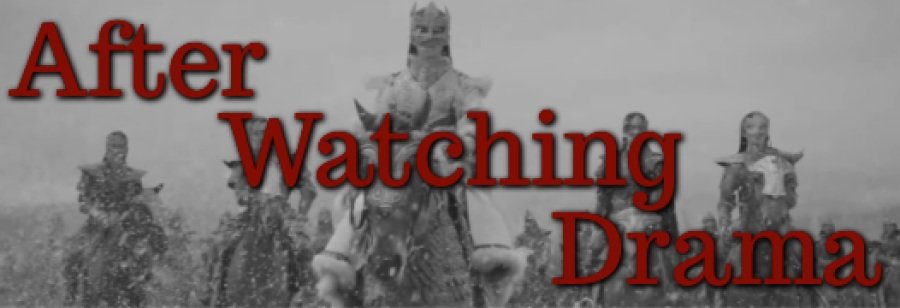
CONGRATULATIONS ON COMPLETING THE SHOW!
Withdrawal Symptoms
You know a drama is epic when you experience withdrawal symptoms at the conclusion of it all. After all the time and energy spent in experiencing the journey of the story together with the characters that you have grown to appreciate and love, there's just no turning back the clock and forgetting all that you've seen just to re-live the entire experience all over again.
What are the typical symptoms, and how do we get through them?
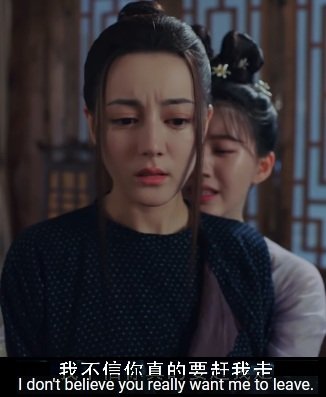 A feeling of emptiness and a sense of loss. Completing a great drama is like saying goodbye to a companion with whom you've bonded over a certain time frame. During times like these, emotional support is paramount, and for this drama, there's no shortage of viewers who still feel this way. You don't have to go through it alone.
A feeling of emptiness and a sense of loss. Completing a great drama is like saying goodbye to a companion with whom you've bonded over a certain time frame. During times like these, emotional support is paramount, and for this drama, there's no shortage of viewers who still feel this way. You don't have to go through it alone.- Going through a drama slump. Because nothing else is comparable to the grand spectacle that you've just witnessed. The bar is set so high that you fear nothing else will ever surpass it. At least, not in the foreseeable future anyway. There are several ways to address this situation. A brief respite to "grieve" - time heals all pain, after all, and for some folks, it would be incredibly hard to get into another story soon after. For others, embarking on a completely different production might help - a non-historical perhaps, or even from a different country. Last but not least, the final option would be to re-watch the drama because, why not? If letting go is hard, then let's hold on a little longer then.
- Missing the cast already. Getting over the actors' superb performances and your attachments to the characters they portrayed isn't easy. Why not watch them in other dramas? See a different side to the cast and admire their talents and versatility through their repertoire of works.
- For extreme cases, especially for an ending that's dissatisfying (rushed, unrealistic) or even traumatizing (tragically sad), let it all out by ranting. It's not healthy to bottle up all those emotions and feelings. MDL is the perfect platform to vent your frustrations and share your discontent with or confide in your fellow users. However, always remember to be mindful of disclosing spoilers.
OTHERS TIPS THAT MAKE YOUR
WATCHING EXPERIENCE MORE ENJOYABLE
There are so many ways to experience a drama in its entirety. Of course, the first and most obvious step is watching it. But there's so much more to just enjoying the released episodes. The amount of money, time, effort, and expertise by the whole cast and crew that goes into the entire production is just unbelievable. Additionally, as with all other productions, so many things happen behind the scenes that are not presented in the main footage. For instance, unedited additional footage, the process of creating certain scenes and special effects, the cast being directed, and the hilarious bloopers. All these are usually available in various media outlets and streaming platforms, presented as:
- The Making of The Long Ballad
- Behind-the-scenes (BTS) footages
Here's a condensed version of both that we've prepared for your viewing pleasure:
THE MAKING OF THE LONG BALLAD
| Director Chu Yui Bun (right), wearing a custom-made mask designed by The Long Ballad costume department, discussed a scene with a team member. He is a renowned director who has directed popular dramas Noble Aspirations and Noble Aspirations II, Ashes of Love, Eternal Love of Dream, and Skate Into Love. Looking forward to the upcoming dramas he directed The Blue Whisper: Part 1 and The Blue Whisper: Part 2 starring Dilraba Dilmurat and Allen Ren. |
Although filming at Hengdian World Studio means the production team could rent sets, costumes, and props from the studio, but they still made sets and props unique for the drama.
Some sets are outdoor, including the Eagle Division camp. The production team rent land outside in the outskirt of Hengdian, spread grass seed to grow grass, and built Ashile Clan tents.
If you go back and watch the clip when Chang Ge is shot with two arrows carefully, you will notice from her eyes reflection that both arrows are actually flying through the air to her. This shows how meticulous the filming production was. Some details were for aesthetic or perfection, like the two arrows shot example. Others were crucial or symbolic. You blink, you miss!
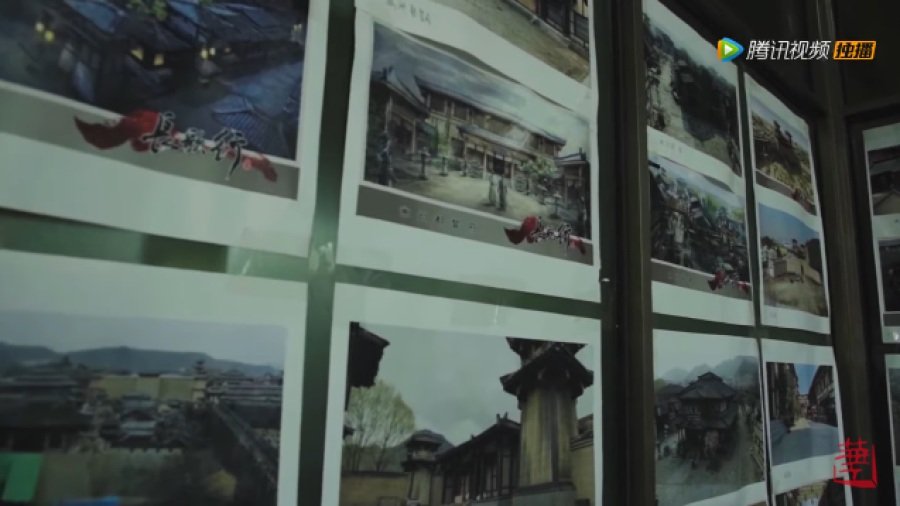 Mapping each location Mapping each location | 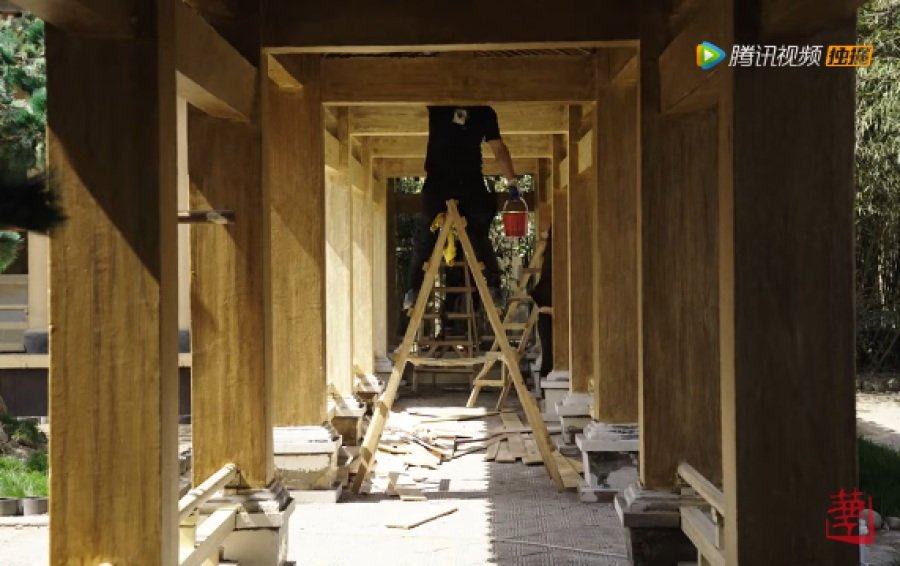 Building sets Building sets | 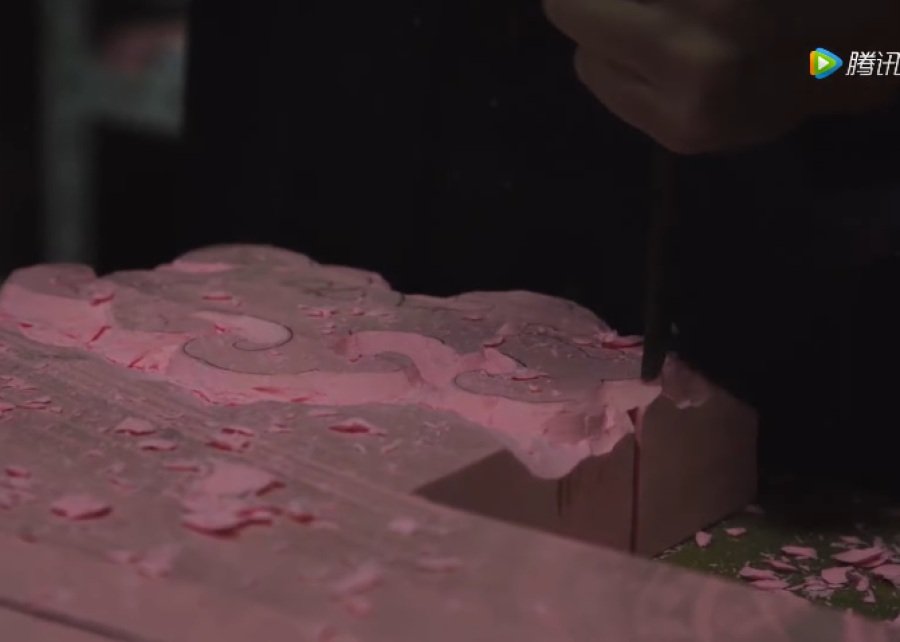 Carving palace details. |
 Sewing soldier costumes | 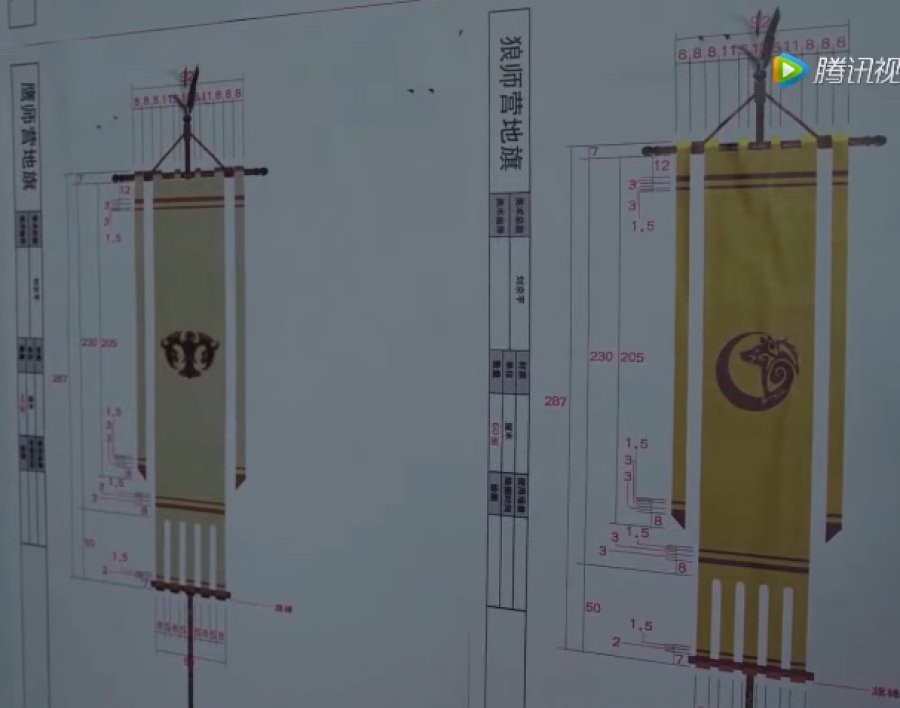 Designing royal banners | 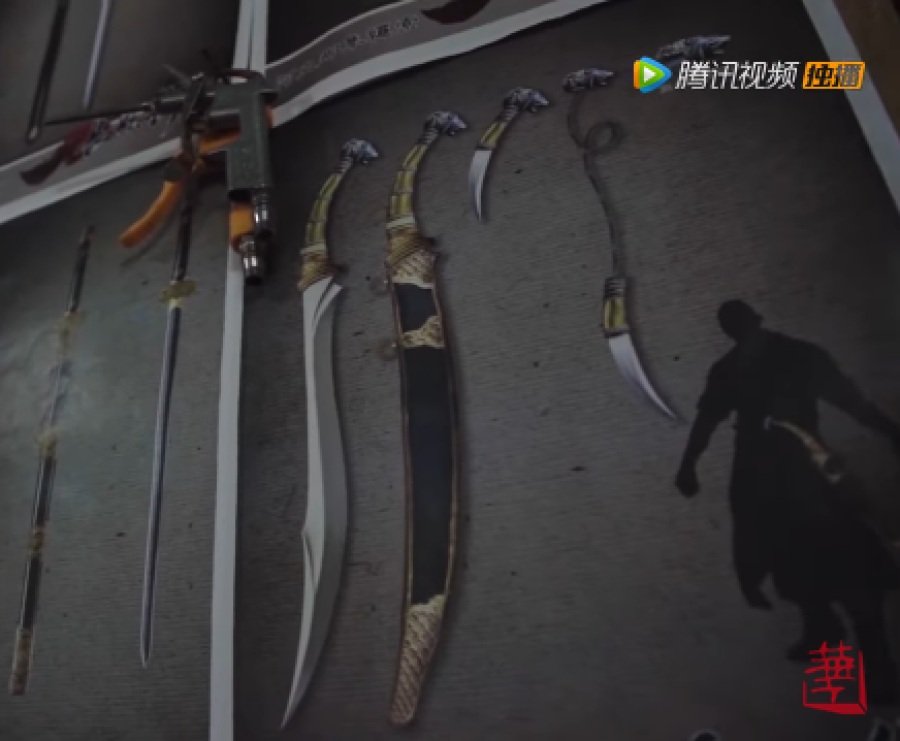 Creating character's weapons Creating character's weapons |
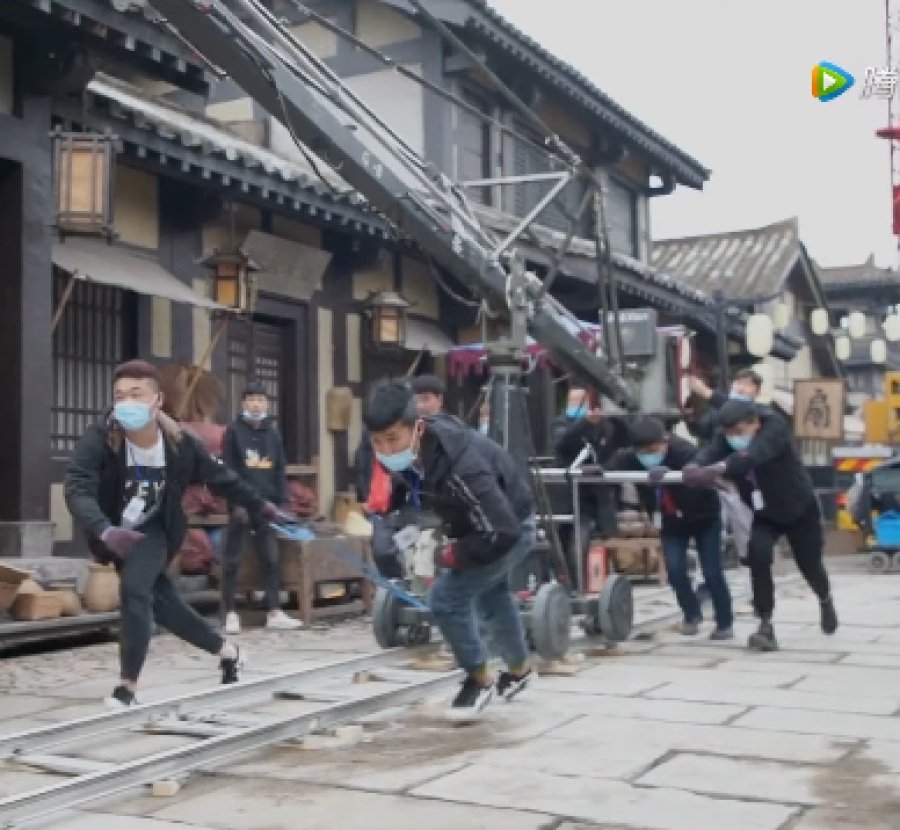 Pulling heavy equipment | 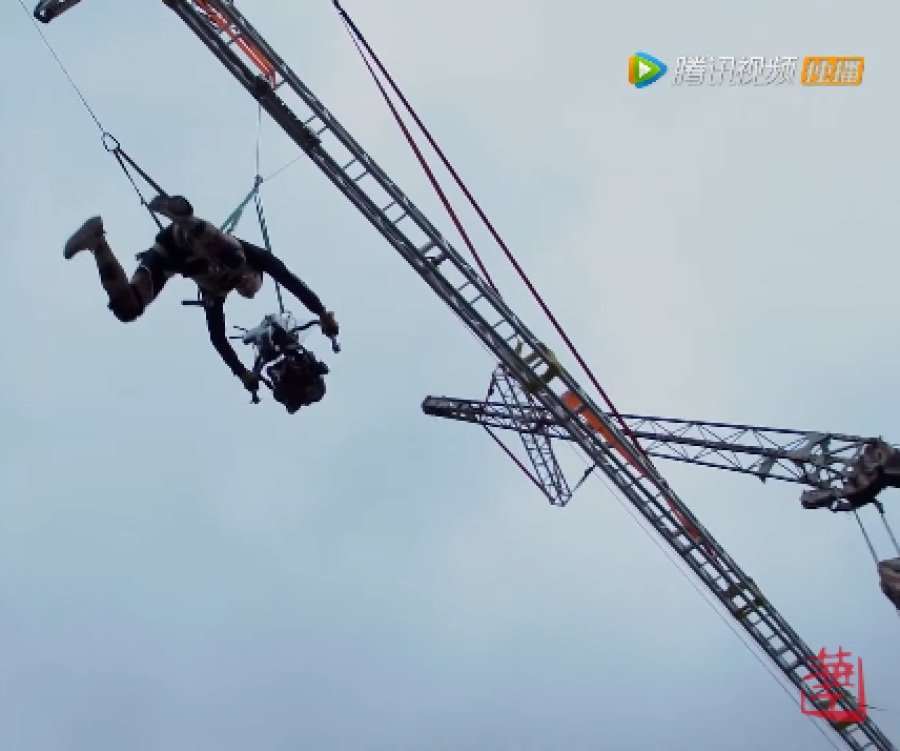 Flying cameraman Flying cameraman | 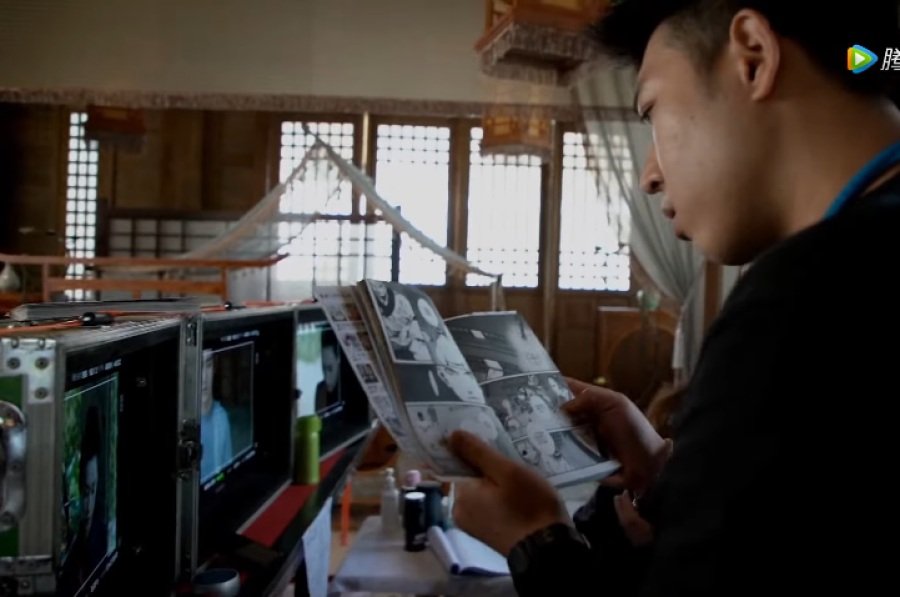 Reading manhua for editing Reading manhua for editing |
BEHIND THE SCENE CLIPS
What we see on the screen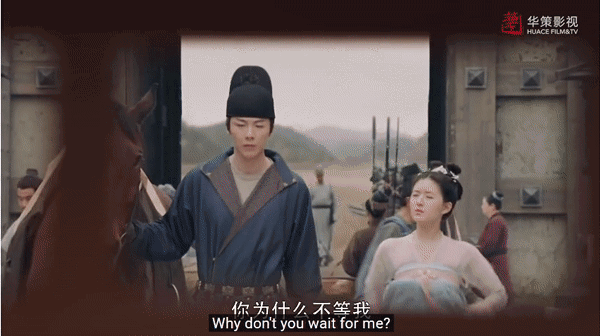 Hao Du nonchalantly throws Le Yan onto the horse and rides away. Hao Du nonchalantly throws Le Yan onto the horse and rides away. | What happened behind the scene |
Other BTS clips can be seen in the official China Huace TV Playlist.
THE OST
Music plays a major role in elevating any production, and for historical dramas, the soundtrack is of the utmost importance. Both the original score and songs add much depth to the scenes and enrich the storytelling to the point that viewers, even years later, are able to relate them to certain depictions in the drama because the music has been ingrained into their psyche.
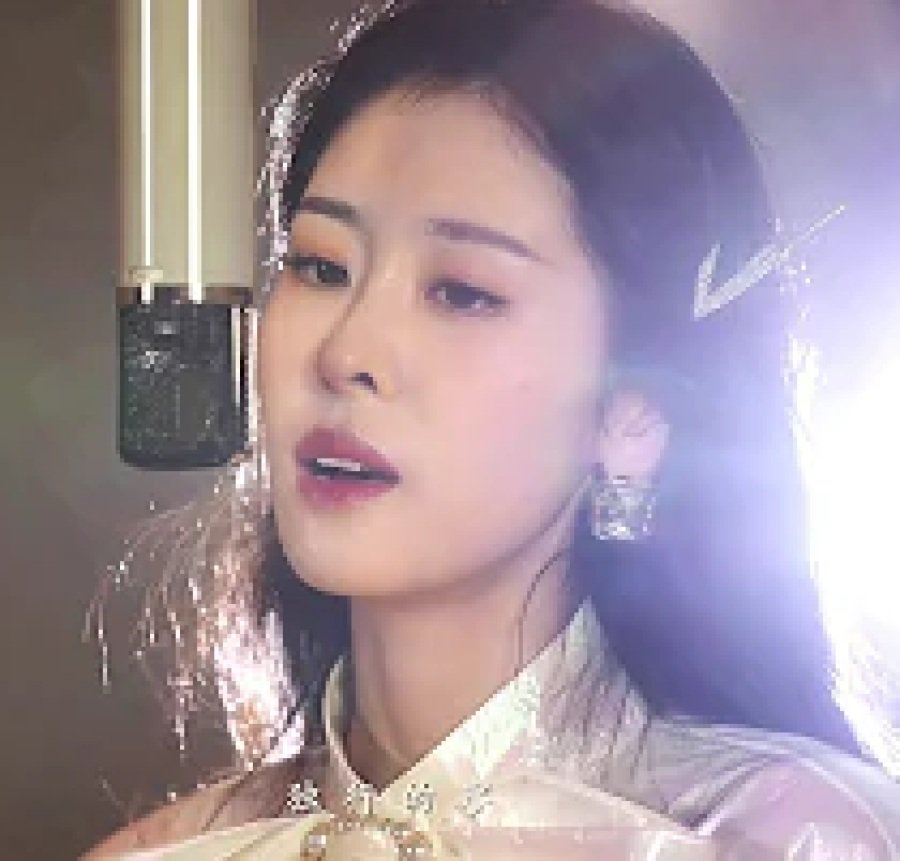 Zhang Bi Chen | The Love Ballads The soundtrack for The Long Ballad is absolutely exquisite, and that is no exaggeration! Beautifully composed love ballads performed by renowned singers, this is a real treat for viewers indeed. |  Zhou Shen |
Our tip is simple - go listen to the songs right now! In particular, the intro and outro themes are truly magical and enthralling. Check out the official OST music videos here:
- Opening song: The Direction of Light (光的方向) by Zhang Bichen (张碧晨)
- Ending song: Cocoon (繭) by Zhou Shen (周深)
- If Return (如若归来) by Sa Ding Ding (萨顶顶)
- Falling Sand (落砂) by Jin Wen Qi (金玟岐)
- I Wish You Were My Long Lasting (多麼願你是我恆久的歌) by Zhao Lu Si (趙露思)
- A Love Like Before (一愛如故) by Liu Yu Ning (刘宇宁)
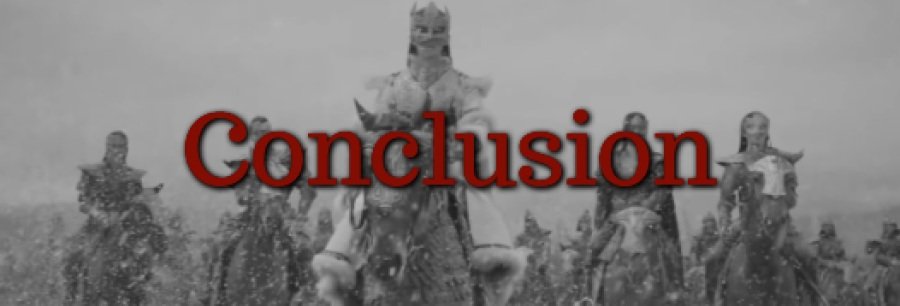 Just being here in MDL is the most important step that you've already taken. Make full use of this platform by reading articles such as this one and getting in touch with the community, including folks like yours truly. We will certainly do our best in sharing our love for historical dramas, experience from watching countless productions, and also aspects to look out for. When in doubt, please feel free to talk to us at any time. We're not perfect and may not have all the answers, but we'll at least refer you to those who probably do.
Just being here in MDL is the most important step that you've already taken. Make full use of this platform by reading articles such as this one and getting in touch with the community, including folks like yours truly. We will certainly do our best in sharing our love for historical dramas, experience from watching countless productions, and also aspects to look out for. When in doubt, please feel free to talk to us at any time. We're not perfect and may not have all the answers, but we'll at least refer you to those who probably do.
We hope you have enjoyed reading this write-up and find the tips useful in your historical drama-watching journey. Perhaps you'll be intrigued to pick up The Long Ballad as your next drama to watch as well!

Credits: We do not own any of the images; credits go to their respective owners. The images are from drama screenshots, official posters and stills, behind-the-scenes clips, and official OSTs. Gifs are made by Cho Na from behind-the-scene clips and drama screenshots.
Editors: BrightestStar (1st editor), YW (2nd editor)

